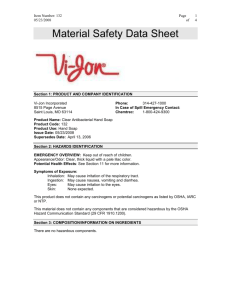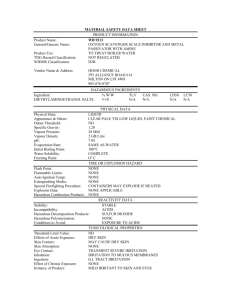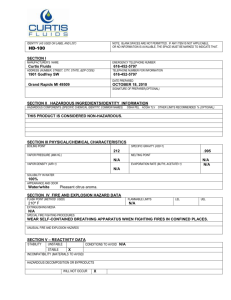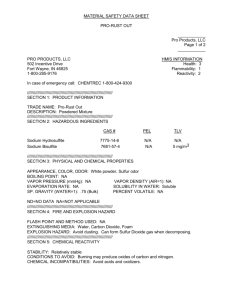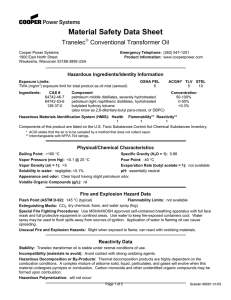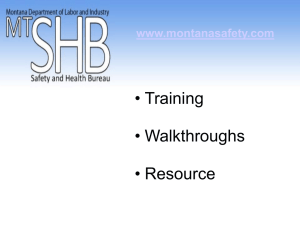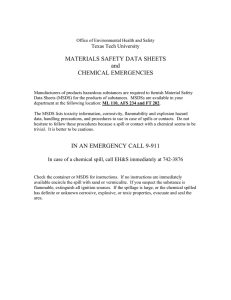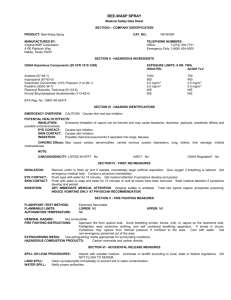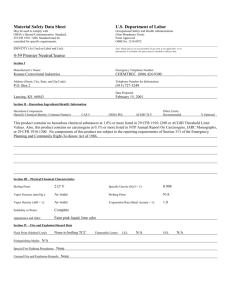Material Safety Data Sheet CrossTrans 206
advertisement
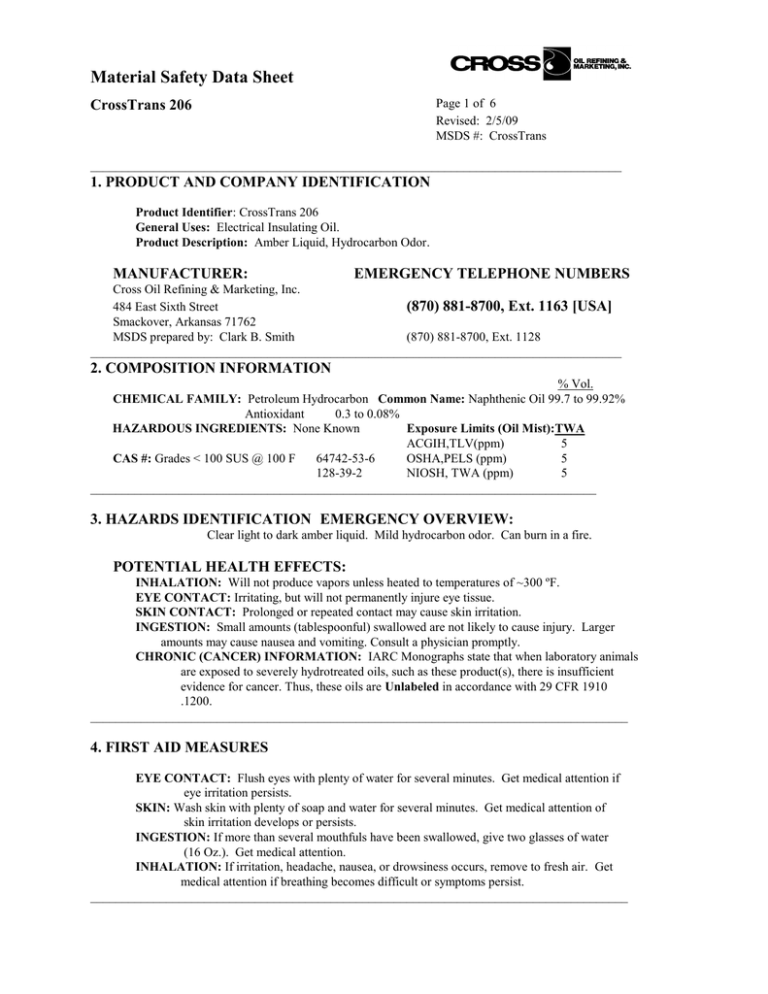
Material Safety Data Sheet Page 1 of 6 Revised: 2/5/09 MSDS #: CrossTrans CrossTrans 206 ____________________________________________________________________________________ 1. PRODUCT AND COMPANY IDENTIFICATION Product Identifier: CrossTrans 206 General Uses: Electrical Insulating Oil. Product Description: Amber Liquid, Hydrocarbon Odor. MANUFACTURER: EMERGENCY TELEPHONE NUMBERS Cross Oil Refining & Marketing, Inc. 484 East Sixth Street (870) 881-8700, Ext. 1163 [USA] Smackover, Arkansas 71762 MSDS prepared by: Clark B. Smith (870) 881-8700, Ext. 1128 ____________________________________________________________________________________ 2. COMPOSITION INFORMATION % Vol. CHEMICAL FAMILY: Petroleum Hydrocarbon Common Name: Naphthenic Oil 99.7 to 99.92% Antioxidant 0.3 to 0.08% HAZARDOUS INGREDIENTS: None Known Exposure Limits (Oil Mist):TWA ACGIH,TLV(ppm) 5 CAS #: Grades < 100 SUS @ 100 F 64742-53-6 OSHA,PELS (ppm) 5 128-39-2 NIOSH, TWA (ppm) 5 ________________________________________________________________________________ 3. HAZARDS IDENTIFICATION EMERGENCY OVERVIEW: Clear light to dark amber liquid. Mild hydrocarbon odor. Can burn in a fire. POTENTIAL HEALTH EFFECTS: INHALATION: Will not produce vapors unless heated to temperatures of ~300 ºF. EYE CONTACT: Irritating, but will not permanently injure eye tissue. SKIN CONTACT: Prolonged or repeated contact may cause skin irritation. INGESTION: Small amounts (tablespoonful) swallowed are not likely to cause injury. Larger amounts may cause nausea and vomiting. Consult a physician promptly. CHRONIC (CANCER) INFORMATION: IARC Monographs state that when laboratory animals are exposed to severely hydrotreated oils, such as these product(s), there is insufficient evidence for cancer. Thus, these oils are Unlabeled in accordance with 29 CFR 1910 .1200. _____________________________________________________________________________________ 4. FIRST AID MEASURES EYE CONTACT: Flush eyes with plenty of water for several minutes. Get medical attention if eye irritation persists. SKIN: Wash skin with plenty of soap and water for several minutes. Get medical attention of skin irritation develops or persists. INGESTION: If more than several mouthfuls have been swallowed, give two glasses of water (16 Oz.). Get medical attention. INHALATION: If irritation, headache, nausea, or drowsiness occurs, remove to fresh air. Get medical attention if breathing becomes difficult or symptoms persist. _____________________________________________________________________________________ Material Safety Data Sheet Page 2 of 6 Revised: 2/5/09 MSDS #: CrossTrans CrossTrans 206 _____________________________________________________________________________________ 5. FIRE FIGHTING MEASURES Flash Point, ºC (Method) Ignition Temp.ºF Flammability Limits (%) See Section 9 (COC) Not Determined Not Determined RECOMMENDED FIRE EXTINGUISHING AGENTS AND SPECIAL PROCEDURES According to NFPA Guide, use water spray, dry chemical, foam, or carbon dioxide. Water or foam may cause frothing. Use water to cool fire exposed containers. If a leak or spill has not ignited, use water spray to disperse the vapors and to provide protection for persons attempting to stop the leak. UNUSUAL OR EXPLOSIVE HAZARDS: None _____________________________________________________________________________________ 6. ACCIDENTAL RELEASE MEASURES Notify the appropriate authorities immediately. Contain spill, if possible. Avoid breathing vapor. Use selfcontained breathing apparatus or supplied air for large spills or in confined areas. Wipe up or use suitable absorbent material and shovel into appropriate container for disposal. Prevent entry into sewers or waterways. Avoid contact with skin, eyes or clothing. _____________________________________________________________________________________ 7. HANDLING AND STORAGE PRECAUTIONS: Minimum feasible handling temperatures should be maintained Periods of exposure to high temperature should be minimized. Water contamination should be avoided. _____________________________________________________________________________________ 8. EXPOSURE CONTROLS / PERSONAL PROTECTION PROTECTIVE EQUIPMENT EYE/FACE PROTECTION: Chemical-type goggles or face shield recommended to prevent eye exposure. SKIN PROTECTION: Workers should wash exposed skin several times daily with soap and water. Soiled clothing should be laundered or dry-cleaned at least weekly. RESPIRATORY PROTECTION: Airborne concentrations should by kept to lowest levels. If vapor is generated, use respirator approved by OSHA or NIOSH as appropriate. Supplied air respiratory protection should be used for cleaning large spills or upon entry into tanks, vessels, or other confined spaces. See Exposure Limit below. VENTILATION: Must be adequate to meet exposure limits below. EXPOSURE LIMIT (TOTAL PRODUCT) 5 mg/m3 for mineral oil mist over an 8 hour daily exposure (ACGIH). _____________________________________________________________________________________ Material Safety Data Sheet Page 3 of 6 Revised: 2/5/09 MSDS #: CrossTrans CrossTrans 206 _____________________________________________________________________________________ 9. PHYSICAL AND CHEMICAL PROPERTIES APPEARANCE: Bright ,clear liquid. Mineral odor. % VOC: 100 (Can be totally burned) FREEZING POINT: Not applicable VAPOR PRESSURE: Insignificant @ atmospheric pressure pH: Not available SOLUBILITY IN WATER: Insoluble VAPOR DENSITY (Air=1): 1+ GRADE 206 VISCOSITY, cSt @ 40 C 9.58 FLASH, ºC (COC) 152 SPECIFIC GRAVITY .896 PCA’s (IP-346) 1.5 IBP, °C 212 ____________________________________________________________________________________ 10. STABILITY AND REACTIVITY This material reacts violently with strong oxidizers. Evolves toxic levels of carbon monoxide, carbon dioxide irritating aldehydes and keytones when heated to combustion. Hazardous polymerization does not occur. _____________________________________________________________________________________ 11. TOXICOLOGICAL INFORMATION TOXOLOGICAL INFORMATION (ANIMAL TOXICITY DATA) Median Lethal Dose (LD50 LC50) (Species) Oral: Believed to be >5g/kg (rat); practically non-toxic Inhalation: Not Determined Dermal: Believed to be >3 g/kg (rat); practically non-toxic. Irritation Index: Estimation of Irritation (Species). Skin: Believed to be <0.5/8.0 (rabbit); no appreciable effect Eyes: Believed to be <15/110 (rabbit); no appreciable effect Sensitization: Not Available Other: None The International Agency for Research on Cancer (IARC), one of the Occupational Safety and Health Association’s (OSHA) authorities for establishing carcinogenic potential, has specifically evaluated Naphthenic Oils. IARC found that Mildly Hydrotreated (Hydrofinished) Naphthenic Oils are carcinogenic to laboratory animals. IARC has NOT found Severely Hydrotreated Naphthenic Oils to be carcinogenic. These products are classified as Severely (Not Mildly) Hydrotreated under both IARC and OSHA definitions. One refiner reports that a lifetime dermal application of this type oil produced skin masses on mice, which correlated with the skin irritation response levels of individual test animals. Additional studies attribute these masses to a weak _____________________________________________________________________________________ Material Safety Data Sheet Page 4 of 6 Revised: 2/5/09 MSDS #: CrossTrans CrossTrans 206 _____________________________________________________________________________________ 11. TOXICOLOGICAL INFORMATION Continued promotional activity. These studies also showed that this product is not a mutagen, not a tumor initiator, and not a complete chemical carcinogen. Under normal anticipated conditions of use, this product should not present a risk to human health. _____________________________________________________________________________________ 12. ECOLOGICAL INFORMATION No data is available on the adverse effects of this material on the environment. A film or sheen will cause discoloration of the water surface or adjoining shoreline. _____________________________________________________________________________________ 13. DISPOSAL CONSIDERATIONS This product has been evaluated for RCRA characteristics and does not meet the criteria of a hazardous waste if discarded in its purchased form. Under RCRA it is the responsibility of the user of the product to determine at the time of disposal , whether the product meets RCRA criteria for hazardous waste. This product is subject in service to chemical alteration, which may render the resulting material hazardous. _____________________________________________________________________________________ 14. TRANSPORT INFORMATION DOT PRODUCT CLASS PLACARD NO. PACKAGING Not App. Not.App Not App. Not App. _____________________________________________________________________________________ 15. REGULATORY INFORMATION TSCA: OSHA: All components of this material are listed in the U.S. TSCA Inventory. IARC Monographs state that when laboratory animals are exposed to severely hydrotreated oils, such as these products(s), there is insufficient evidence for cancer. Thus, these product are Unlabeled in accordance with 29 CFR 1910.1200 SARA TITLE III Section 302/304 Extremely Hazardous Substance Section 311 - EPA Hazard Categories Immediate Health Delayed Health None None Fire Minor > 250 F Section 313 Toxic Chemicals CERCLA Section 102(a) Hazardous Substance Sudden Pressure Release None None Reactive None None No Reportable Quantity (RQ) Substances CANADIAN DOMESTIC SUBSTANCES LIST - - All components of this material are listed. ____________________________________________________________________________________ Material Safety Data Sheet Page 5 of 6 Revised: 2/5/09 MSDS #: CrossTrans CrossTrans 206 ____________________________________________________________________________________ 16. OTHER INFORMATION Hazard Ratings Recommended for Containers NFPA Fire 1 Health 1 Reactivity 0 Specific Hazard none HMIS Health 1 Flammability 1 Reactivity 0 Personal Protection Index B This information is furnished without warranty, expressed or implied, except that it is accurate to the best knowledge of Cross Oil Refining & Marketing Company, Inc.. The data on this sheet is related only to the specific material designated herein. Cross Oil Refining & Marketing Co., Inc. assumes no legal responsibility for use or reliance upon these data. NA = Not Available Not App. = Not Applicable _____________________________________________________________________________________ 17.PRODUCT LABEL Product Trade Name: CrossTrans 206 Tank Car Number: NA Date: 2/5/09 Cross Truck Loading Manifest No: NA WARNING Avoid Prolonged Breathing of Mist or Spray. Average exposure to airborne mist for an 8-hour workday should not exceed 5.0 milligrams of mist per cubic meter of air. Avoid Eye and Skin Contact: Wear oil-impervious protective clothing. If clothes become contaminated, change to clean clothing after thoroughly washing exposed skin with soap and warm water. FIRST AID Inhalation: If overcome by fumes, remove from exposure immediately and call a physician. Skin: Wash with warm water and soap until the exposed area is clean. Eyes: Flush with water for at least fifteen (15) minutes. See physician if symptoms persist. Ingestion: Do not induct vomiting. Obtain medical assistance. Small amounts that accidentally enter through the mouth should be rinsed out until no taste of it remains. FIRE CONTROL Use water spray or fog, chemical foam, dry powder or carbon dioxide. SPILL / LEAK Add absorbent (sand, sawdust, etc.) to the spill area. Contain spill. Advise State Environmental Protection Agency, if required. Put recovered material in an appropriate container and dispose of according to federal, state, and local regulations. For guidance call Cross Oil Refining & Marketing Co., Inc. at (870) 881-8700, Ext. 1163 _____________________________________________________________________________________ Material Safety Data Sheet Page 6 of 6 Revised: 2/5/09 MSDS #: CrossTrans CrossTrans 206 _____________________________________________________________________________________ 17.PRODUCT LABEL Continued STORAGE Store in original or equivalent container. Store at the lowest practical temperature. Keep container closed when not in use. Do not apply heat or flame to the container _____________________________________________________________________________________
